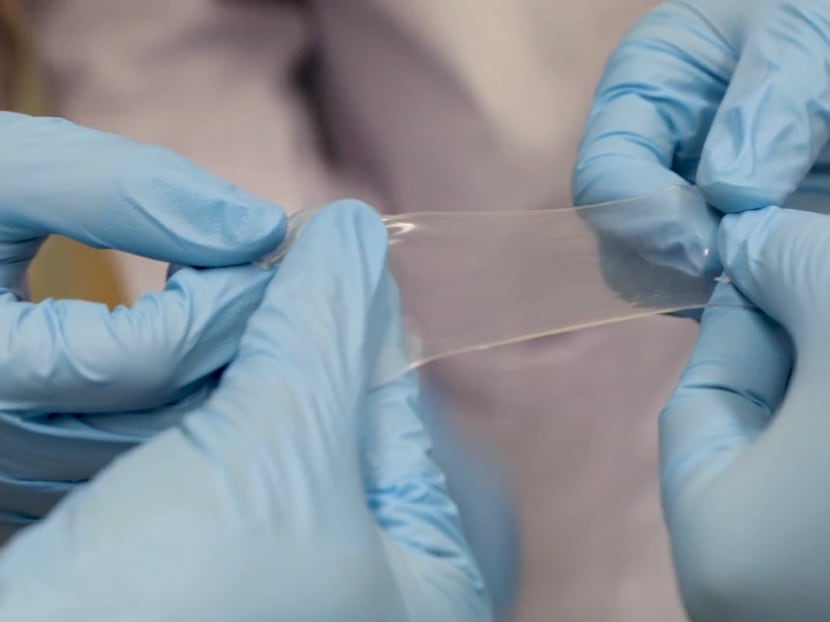Cutting-edge tech: New material repairs itself when scratched, slashed
SINGAPORE — Researchers at the National University of Singapore (NUS) have developed a self-repairing material that they hope will someday be used to make mobile touchscreens, prosthetics and soft robotics that can heal themselves from cuts or scratches.

Researchers from the National University of Singapore took inspiration from the skin of jellyfish to make an electronic “skin” which can repair itself and is transparent, water-resistant and stretchable.
SINGAPORE — Researchers at the National University of Singapore (NUS) have developed a self-repairing material that they hope will someday be used to make mobile touchscreens, prosthetics and soft robotics that can "heal" themselves from cuts or scratches.
The researchers took inspiration from the skin of jellyfish to make the new material, an electronic “skin” which is transparent, water-resistant, stretchable and can conduct electricity.
It can also repair itself when exposed to air or submerged in water.
So if a piece of the material is cut into two, the two separate pieces can simply be placed back together and they will “heal” and rejoin in about few hours to a few days, with no visible scars or marks where the cut was made.
FIRST TO BE WATERPROOF
Self-healing materials are not new, the researchers said, but this is the first time that scientists have managed to make such a material still work efficiently when wet.
It is also the first time that researchers have managed to make a transparent version.
Assistant Professor Benjamin Tee, a President’s Assistant Professor at the Department of Materials Science and Engineering in NUS, said: “We began to look at jellyfishes… (to see) how we could make an artificial material that could mimic the water-resistant nature of jellyfishes and yet also be touch-sensitive.”
Asst Prof Tee has been working on self-healing electronic skin sensors for more than seven years and led the team of researchers which developed this new material.
The team of eight from NUS, Tsinghua University and the University of California Riverside developed the material in just over a year.
THE SCIENCE
The gel is made by combining a fluorocarbon-based polymer with a fluorine-rich ionic liquid.
The polymer network interacts with the ionic liquid via highly reversible ion-dipole interactions, allowing it to self-heal by binding to itself at cuts and tears.
Aside from being waterproof, the gel can be stretched up to 20 times its original length and can be 3D-printed into electronic circuits with pressure sensors and touch sensors that mimic biological tissues, making it prime for use in prosthetics.
Other potential uses include:
Screens for personal electronics such as foldable phones
Biomedical tools such as robots that perform minimally invasive surgeries
Soft robotics such as underwater exploration robots
Spacesuit parts, due to its ability to self-repair
POTENTIAL TO REDUCE E-WASTE
Beyond the versatility of the electronic skin to be used in various industries, it also has the potential to reduce electronic waste.
“Millions of tonnes of electronic waste from broken mobile phones, tablets (and other devices) are generated globally every year,” Asst Prof Tee said.
“We are hoping to create a future where electronic devices made from intelligent materials can perform self-repair functions to reduce the amount of electronic waste in the world.”
Asst Prof Tee said that the team is in talks with prosthetics centres as well as some “big companies” in the speciality chemicals industry that supply materials for screens, but was unable to give any names.
The team hopes to get the material commercially viable in five years’ time.








